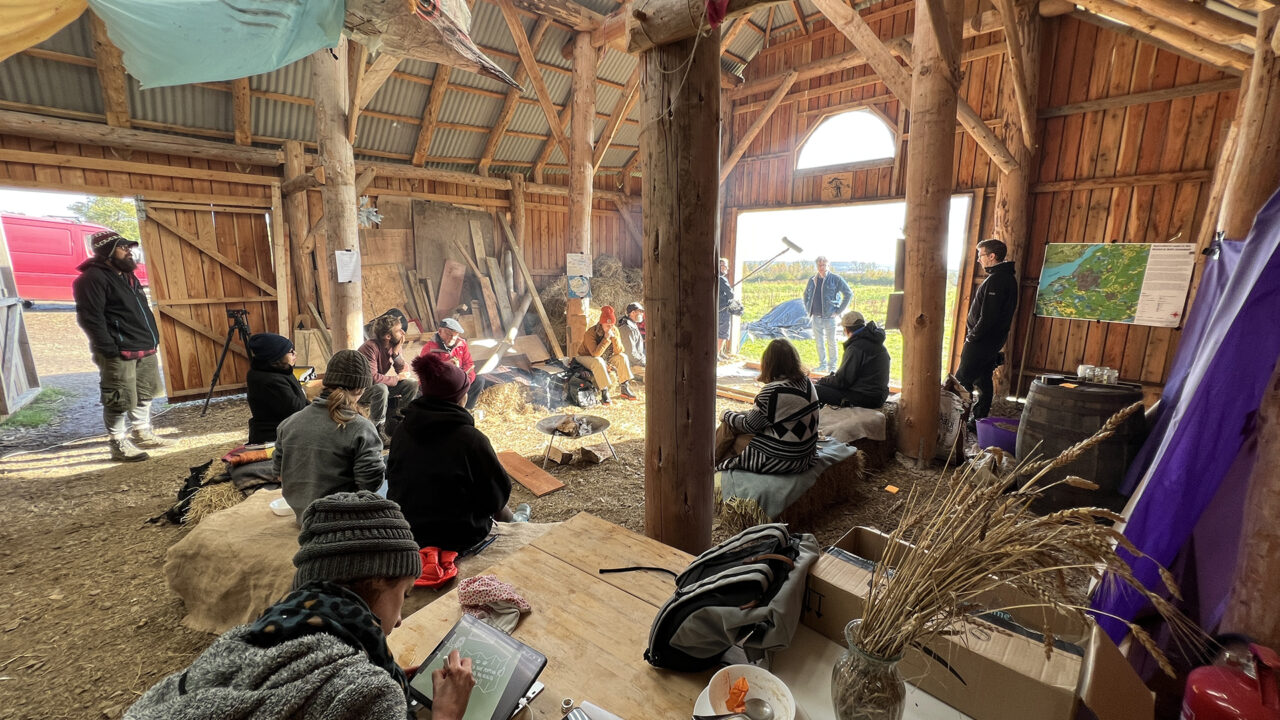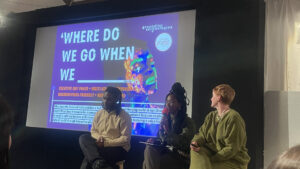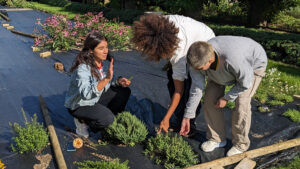- Posted on February 6th, 2024
Grounding Technologies

Following connecting at Julie Bicycle’s UK Creative Climate Leadership (CCL) programme in 2023 – Zoe Rasbash (producer and author of the post below), Tay Aziz (advisory board), Emmanuella Morsi (lead on a funded project) and Ruby Pugh (collaborator on funded project) – collaborated on a new Grounding Technologies project as part of Bristol and Bath Creative R+D. The CCL residential both inspired and affirmed this project centred on resourcing communities already doing creative climate justice work.
Here they share key grounding principles for what responsible, grounded, technological work could be, as well as key areas for developing creative approaches to climate action and the green economy.
At Bristol+Bath Creative R+D, we’ve spent five years working to raise the bar for the region’s creative industries. We’ve sought to support a socially responsible environment for creativity and innovation that is both inclusive and sustainable, putting people before technology.
But looking ahead to the next five, ten, twenty years, we have to radically transform our sector to combat and adapt to the climate crisis. Our response can no longer focus on quick fixes when the issues are systemic. This challenge is innately creative: we are faced with making our society anew when we don’t know exactly what that looks like.
To engage with this creative task of remaking a world where people and planet thrive, technology, and creative uses of it, can play a crucial role. Harmony between nature, technology and humanity is fundamental to the just, green society we want to build.
Grounding Technologies, our pilot project, explored how creative technology can be utilised locally in service of a just future. The West of England is home to a rich ecosystem of climate and biodiversity action. How, in the hands of people, can creative technology support, enhance and build on the work already happening? How can the skills of the creative sector support climate action?

Intergenerational, interdisciplinary teams learning together
Over the summer of 2023, we invited those working at the emerging intersections of community climate action, art and technology to two ideas labs, to meet, discuss and digest. We then invited participants to apply for six pots of £15k for ideas that explored these questions with us.
Our brilliant teams brought together activists, artists, producers, gardeners, technologists, designers, lawyers, cartographers and musicians – an intergenerational, interdisciplinary cohort from across the West of England Region.
These six projects build on a rich tradition of activism and thought in the West of England region to address the climate crisis, bringing together expertise from across sectors, locations and communities in vibrant collaborations to create tools for the future.
- Eyes on Bristol Airport
An experimental project capturing flight and air traffic data to hold Bristol Airport accountable to its climate pledges. #EyesOnBristolAirport
Bristol Airport Action Network, Stephen Clarke, Gideon Jones, Richard Baxter, Jackie Head, Mary Collett, James Collett. - The Apothecary Network
An app connecting people to a network of decolonial community apothecaries which centre growing, herbology, community, collective care, joy, and connection with nature in radical, anti-racist ways and reclaim green spaces for themselves and their communities.
Marcus Berdaut, Zoe Palmer, Javie Huxley, Chinonyerem Odimba, Zaina Nesayem. - Focus – but where?
A playful online interactive crowdsourced zine/game that explores the intersection between climate change activism and our complex information environment, using eye tracking to explore direct climate action and comms.
Kexin Liu, Kai Charles, Inigo Hartas, Xingzhi Zheng. - Garden Lab Whispers Grow
A project based on an allotment in Knowle West, investigating how new sensor technology can be combined with local, embodied and non-human knowledge to further climate action.
Knowle West Media Centre, Annali Grimes, Martha King, Paul Granjon, Ruth Hennell. - Greenbelt 2.0, Rings of Resilience Resistance + Renewal
A project to reimagine the use of Greenbelt around Bristol through co-created mapping and animation using data from communities.
Maddy Longhurst, Mark Thurstain, Rueben Armstrong, Yew Tree Farm. - Where Do We Go When We ____,
An investigation into how creative technology might support marginalised and neurodiverse communities to navigate nature experiences and climate action.
Emma Blake Morsi, Ruby Spencer, Olamiposi Ayorinde.

Emerging Intersections, Emerging Principles
In bringing together such a dynamic group, we witnessed an exchange of knowledges and skills which demonstrated a wealth of potential in the transfer of creative methodologies into the green economy sectors at the regional level. We’ve tested out ways to challenge business-as-usual modes of development and found a hunger across our region for exploratory work at this intersection.
Through this process of learning together, we have explored what a collective set of grounding principles for responsible, grounded, technological work could be:
- Honour Nature: Placing the earth at the centre of thinking allows for material cycles, and what we make and do in the first place, to become aligned with a more just environmental position, whereby the earth and its finite resources are honoured and respected.
- Seek Reparations: From technology companies for the environmental damages that they are causing. Address their intentional bad design, which privileges planned obsoletism and increased eWaste.
- Honour what is already in place including local knowledge, lived experiences: Foreground the lived experiences of people and communities. Honour ancestral wisdoms and support what is already out there. Provide space for connectivity, reciprocity and collectivism.
- Act responsibly: Act with allyship and solidarity, empathy and understanding. Be open to challenge. Create space for active hope and resilience. Acknowledge the privilege that one’s social position may bring.
- Commit to access, share knowledge: Think creatively about what access means, and how it is the cornerstone of just climate action. Seek to share knowledge in an open and generous manner.
- Commit to material use, repair, reuse and open design: Work with existing technologies. Consider the full material cycle from cradle to grave. Re-use and repair technology at every opportunity. Use open hardware and software. Create applications that can be modified by communities for their purposes. Design with flexibility in mind.
- Decolonise Technology: From its imperialist, capitalist, racist, Western, white and often patriarchal point of view by providing support, time and funding to understanding what it would mean to re-write technology from other points of view.
- Re-image technology, R&D models: How can we do R&D differently and shift emphasis from profit to collective wellbeing? How do we balance time, money and expectations? How can we foster change from within politically turgid environments?
- Avoid greenwashing: Avoid linking carbon counting to greenwashing. Count all the elements and not just what suits your reporting. Remain critical of quantitative-only climate mitigation measures.

We see three key areas for developing creative approaches to climate action and the green economy: Place, Process and People.
- Place matters: in order for just climate action to shift behaviour, it needs to be meaningfully connected to the everyday places we occupy.
- Processes must shift: A longer-term view is needed that entails working deeply with communities over a period of 10 years+ if we are to meet our 2030 carbon-neutral ambitions and create transformational systemic change. Making programmes community-led means taking time to create structures and processes that support codesign, participatory working and good governance. The most marginalised groups in our society often have the least amount of flexibility and capacity to respond to calls. Longer-term germination and team-building periods would prevent the application process being a barrier to diverse leadership in this space.
- People at the centre: The practice of including people requires us to be open, understanding and inviting. Committing to diversity requires constant consideration across all levels of our programme, from leadership, to executive boards, to participants and production teams.
Learn more about our amazing projects.
Read our Report
Grounding Technologies was a 6-month pilot programme and is part of Bristol+Bath Creative R+D, a collaboration between UWE Bristol, Bath Spa, University of Bath, University of Bristol and Watershed which has spent five years working to create a more equitable environment for innovation to raise the bar for the region’s creative industries. Grounding Technologies funding is part of a national AHRC ‘Demonstrator’ programme which aims to understand new pathways for funding in the creative sector. We’re delighted to be joined in this partnership by the West of England Combined Authority for the first time.
